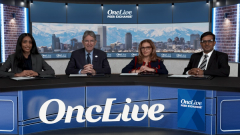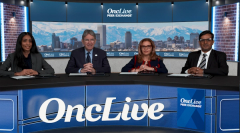
The Role of Allo-HSCT in Higher-Risk MDS
Criteria for identifying patients with MDS most likely to benefit from transplant and choosing the optimal donor source and conditioning regimen on a case-by-case basis.
Episodes in this series

This is a video synopsis/summary of a Peer Exchange featuring Miguel-Angel Perales, MD; Nelli Bejanyan, MD; Amandeep Salhotra, MD; and Arpita Gandhi, MD, MS.
Speakers discuss the role of Orca-T cell therapy (Orca-T) in myelodysplastic syndrome (MDS) and the importance of transplantation in this disease. Risk-stratification tools, particularly the molecular International Prognostic Scoring System-Revised score, are used to identify patients with moderate to high risk or very high-risk disease who have a dismal prognosis and a high risk of transformation to acute myeloid leukemia. Nontransplant strategies have not been very successful in improving outcomes for these patients, as demonstrated in the BMT CTN 1101 trial, where patients with donors had improved survival compared to those without donors. MDS is an approved indication for allogeneic hematopoietic stem cell transplantation (allo-HSCT) in patients with high-risk disease, who are often older than 60 years. Orca-T is considered an ideal graft manipulation strategy to reduce transplant-related mortality and improve relapse-free survival and overall survival. The speakers discuss an abstract evaluating 16 patients from the initial phase 1B study that showed promising results with minimal toxicities and a modified graft-vs-host disease (GVHD) rate of about 75%. They believe Orca-T takes MDS treatment to the next level and should be compared in the ongoing randomized phase 3 study.
Video synopsis is AI-generated and reviewed by OncLive® editorial staff.






































